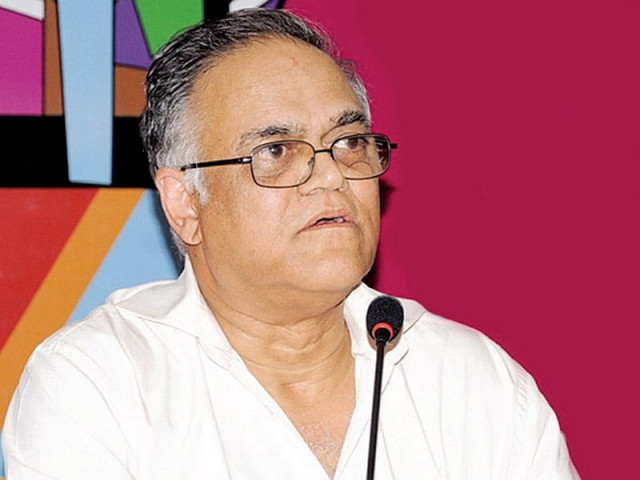Unsurprising finding: Media cannot be left to regulate self, says Jabbar
Media commission member highlights advertiser control, ties between judge and journalist.

TV news channels derive 100 per cent of their revenues from advertisements, so they are completely under the influence of advertisers, says Javed Jabbar.
On Sunday, Javed Jabbar, a member of the commission, talked about the commission’s recommendations at a roundtable discussion organised by German political foundation Friedrich-Ebert-Stiftung.
Among its recommendations, the commission had stated that media cannot be left to exclusively regulate its content. It has suggested new legislation and reforms in existing legislation for media’s content self-regulation.
“The concept of media’s self-accountability needs to undergo a rethink,” Jabbar said at the discussion. “It is so important that we cannot leave media’s freedom and its future just to the media.”
He said the state should provide a legislative framework of guidelines for news media content, with adequate checks and balances that do not curb freedom of expression. Jabbar said there would be some challenges in establishing such a framework, but added that draconian laws that oppress the Pakistani media are no longer possible because of strong media organisations and the flow of information over the Internet.
The commission, which included Justice (retd) Nasir Aslam Zahid, met with 166 people including included federal and provincial government representatives, serving journalists, advertisers and other stakeholders, over the course of the four month-long inquiry.
It presented its recommendations in two sections. The first dealt with media in the context of election coverage and campaign advertisements, while the second section detailed general recommendations about state-owned and private media organisations.
Jabbar said the Supreme Court determined the mandate of the two-member commission through nine terms of reference.
The commission observed, according to Jabbar, that where the broadcast news media have helped generate a candid, robust debate on a diverse range of issues in the country, their editorial line is strictly under the influence of advertisers. The media also suffer from non transparency in financial matters and lack of trained content controllers, the commission reported.
More importantly, the commission noted that there is an absence of enforcement mechanisms for self-regulation in the news media.
Jabbar said TV news channels in Pakistan have followed the wrong business model, which has led to excessive commercialization.
“TV news channels derive 100 per cent of their revenues from advertisements, so they are completely under the influence of advertisers,” Jabbar said. “Ideally they should have 50 per cent dependency on advertisements and 50 per cent on subscription fees.”
Discussing the recommendations, participants called for more ethical reporting and denounced the mutually beneficial status quo in which the courts might use the media and journalists use the courts to push items on to the national agenda. They condemned cross-ownership and disparity in pay scales between anchorpersons and other journalists.
Participants said there should be a transparent complaints-based process for offensive Internet content instead of a blanket ban, such as the current YouTube ban in Pakistan. They also said protection for women journalists against sexual harassment and violence should be included in the commission’s election coverage recommendations
Jabbar said the commission cannot revise the text of the report but it will present a summary of feedback from the citizens and other stakeholders to the Supreme Court.
He said it is now up to the apex court to decide whether it wants to forward the recommendations to the government for consideration or direct the government to enforce them. Jabbar said the parliament can also take note of the report on its own.
He found it unfortunate that since it was released, the mainstream has focused on the secret fund for journalists and not on the actual contents of the commission’s report.
Published in The Express Tribune, September 9th, 2013.



















COMMENTS
Comments are moderated and generally will be posted if they are on-topic and not abusive.
For more information, please see our Comments FAQ